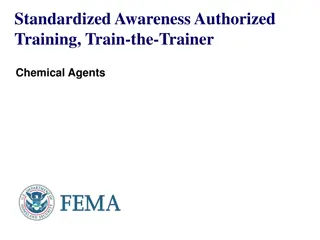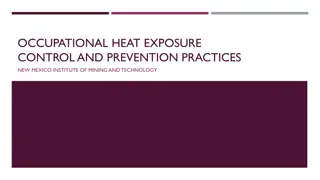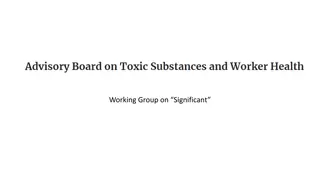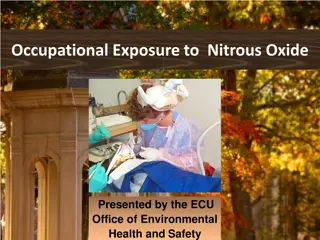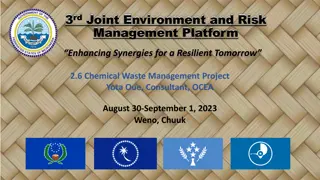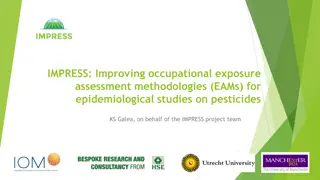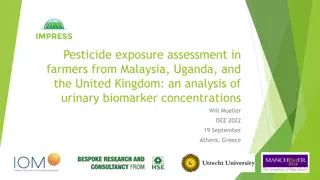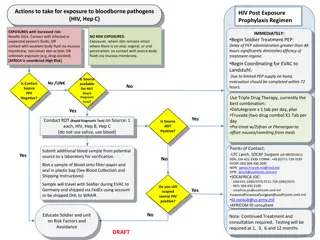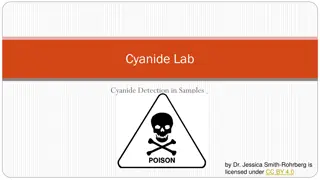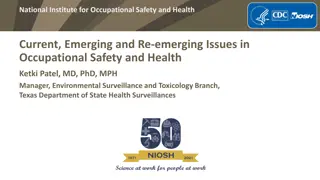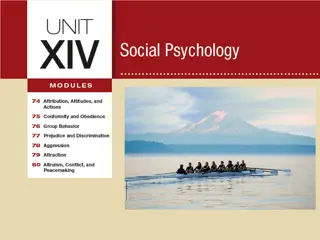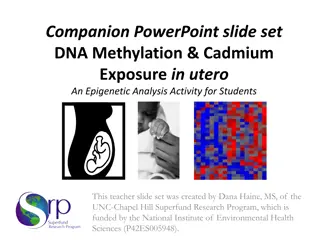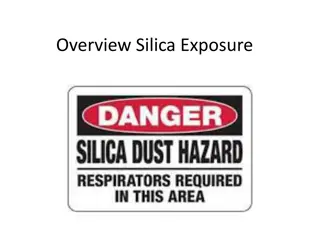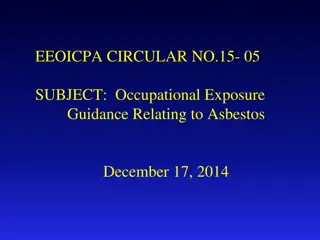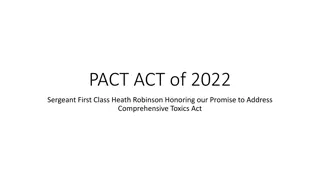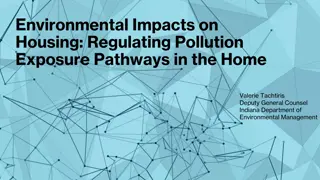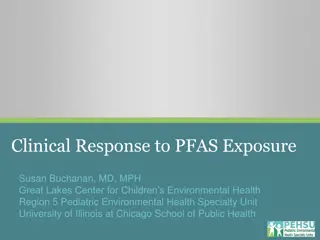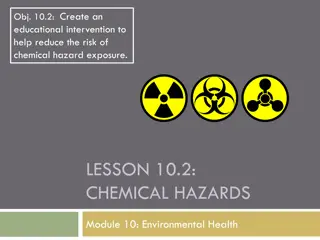Impact of NVIDIA Stock Surge on Mutual Funds and Passive Funds Exposure
NVIDIA's stock surged by 16% following strong financial performance, impacting various mutual funds and passive funds. Mutual funds like Motilal Oswal, Mirae, and Franklin have significant exposure to NVIDIA, while non-broad-based passive funds also hold substantial positions. The exposure of broad-
4 views • 10 slides
Understanding NHANES Data for Environmental Exposure Studies
National Health and Nutrition Examination Survey (NHANES) is a crucial population-based survey in the U.S. that collects data on health and nutritional status. This data supports various applications, including assessing human exposure to environmental chemicals. NHANES conducts biomonitoring to qua
5 views • 27 slides
Chemical Agents Awareness Training Overview
This training module covers standardized awareness and authorized training on chemical agents, including toxic industrial chemicals, riot control agents, and chemical warfare agents. Participants will learn about the physiological signs/symptoms, advantages/disadvantages of using chemical agents for
1 views • 20 slides
Enhancing Chemical Formula Writing Skills for Students
This action research focuses on improving students' ability to write and name chemical formulas. The study addresses challenges in understanding and applying chemical concepts in a general chemistry course. Strategies include utilizing worksheets, group collaboration, and mobile applications to enha
2 views • 13 slides
Occupational Heat Exposure Control and Prevention Practices
Occupational Heat Exposure Control and Prevention Practices at the New Mexico Institute of Mining and Technology covers training for workers exposed to excessive heat, pre-test evaluation, objectives focusing on heat stress and exposure, understanding heat and heat stress, human body's response to h
1 views • 37 slides
Understanding the Significance of Exposure in EEOICPA Procedures
Delve into the complexities of exposure assessment in the context of EEOICPA procedures, examining the nuances of significant exposure levels and their impact on causation determination. Explore proposed recommendations for refining exposure assessment metrics to enhance causation evaluation.
0 views • 9 slides
Understanding Chemical Kinetics: Rates of Reactions and Factors Influencing Them
Chemical kinetics delves into the speed of chemical reactions and the factors that influence reaction rates. This field explores how collisions between atoms, ions, or molecules drive chemical reactions, as well as the role of catalysts, reactant concentration, temperature, and surface area. By unde
0 views • 32 slides
Nitrous Oxide Occupational Exposure Guidelines and Monitoring
This information covers the occupational exposure to nitrous oxide, including its uses, chemical description, routes of exposure, health effects, monitoring methods, and regulatory exposure limits. Nitrous oxide is a colorless gas with various applications in medical, dental, and food processing ind
2 views • 18 slides
Understanding Radiation Safety for XL2 Analyzers
The Niton Model XL2 analyzer uses an X-ray tube that emits radiation when turned on, requiring adherence to the ALARA principle to minimize exposure. Factors like time, distance, and shielding play crucial roles in managing radiation exposure. Learn how to stay safe while using the XL2 analyzer to e
0 views • 11 slides
Enhancing Synergies for Resilient Tomorrow: Chemical Waste Management Project Overview
Enhancing Synergies for a Resilient Tomorrow outlines a project aimed at strengthening the Federated States of Micronesia's capacity in chemical management. The project focuses on monitoring and evaluating chemical use, enhancing legislative frameworks, and establishing a central database for chemic
1 views • 12 slides
Understanding Occupational Exposure to Formaldehyde
Occupational exposure to formaldehyde is common in various industries and settings, including medical laboratories and mortuaries. Formaldehyde is used as a preservative, embalming agent, and in the manufacture of various products. It poses health risks through inhalation and skin exposure, potentia
0 views • 14 slides
Honey Bee Exposure to Pesticides: Routes and Impacts
Analysis by the U.S. Environmental Protection Agency outlines various exposure routes of honey bees to pesticides, including contact with contaminated sources like foliage and soil, ingestion of contaminated pollen and nectar, and inhalation of chemical droplets. Different application types and age
2 views • 13 slides
Enhancing Pesticide Exposure Assessment for Epidemiological Studies
Focuses on IMPRESS project aiming to improve methodologies for assessing occupational pesticide exposure in epidemiological studies. Reviews challenges in retrospective exposure assessment, proposes methodologies, and presents key project results to date, emphasizing the use of various exposure asse
1 views • 15 slides
Pesticide Exposure Assessment in Farmers from Malaysia, Uganda, and the United Kingdom
This study evaluates the impact of pesticide exposure on farmers' health in Malaysia, Uganda, and the UK using urinary biomarker concentrations. Multiple cohorts are analyzed to assess associations between exposure-modifying factors and urine metabolite measurements. The IMPRESS project focuses on i
0 views • 12 slides
Understanding Personal Exposure to Polybrominated Diphenyl Ethers (PBDEs)
This presentation explores the exposure of individuals to PBDEs in residential indoor air, highlighting the background, commercial uses, exposure pathways, and previous studies on PBDEs. It discusses the objectives, methods, results, and conclusions of a study aiming to quantify indoor air exposure
0 views • 22 slides
Photography Basics: Understanding Camera Exposure and Metering
Explore the fundamentals of camera exposure, including aperture, shutter speed, ISO, and metering modes. Learn how to control exposure settings, utilize different metering modes, and troubleshoot common exposure issues to enhance your photography skills.
0 views • 15 slides
Bloodborne Pathogens Exposure: HIV Post Exposure Prophylaxis Regimen
Take immediate action for exposure to bloodborne pathogens like HIV and Hepatitis C through a post-exposure prophylaxis (PEP) regimen. Administer PEP within 48 hours for increased-risk exposures like needle sticks or contact with infected fluids. Coordinate evacuation if needed and conduct Rapid Dia
0 views • 5 slides
Overview of Chemical Reactor Design and Operation
Chemical reactor design involves studying the rates and mechanisms of chemical reactions, as well as the design of reactors for these reactions on a commercial scale. This field combines principles from thermodynamics, chemical kinetics, fluid mechanics, mass transfer, heat transfer, and economics t
0 views • 12 slides
Understanding Cyanide: Sources, Exposure, and Risks
Cyanide is a toxic compound found in various forms such as gases, solids, and liquids that can be harmful to humans and animals. Sources of cyanide exposure include natural processes, industrial activities, plant sources, and combustion products like cigarette smoke. The extent of poisoning depends
0 views • 14 slides
Understanding Workplace Safety Hazards: Physical, Chemical, and Biological Risks
Explore the three main types of workplace safety hazards - physical, chemical, and biological - with a focus on identifying potential risks and ensuring a safe work environment. Learn about common hazards such as repetitive motion, chemical exposure, and handling biological materials, essential for
0 views • 97 slides
Occupational Pesticide Safety and Health Concerns
Occupational safety and health issues related to pesticide exposure are a significant concern globally. Limited surveillance data on pesticide exposure and related illnesses are available, with a high percentage of farmers being affected annually. Various occupations beyond farming also face potenti
1 views • 25 slides
Understanding Chemical Changes and Reactions
Explore the concepts of chemical and physical changes, including balancing chemical equations, physical properties, and examples of chemical reactions. Learn to distinguish between physical and chemical changes through visual aids and learning checks.
0 views • 24 slides
Understanding Attraction and the Mere Exposure Effect
Explore the dynamics of attraction and romantic love, delving into why we are drawn to certain individuals and how familiarity influences our feelings. Uncover key factors such as proximity, attractiveness, and similarity, along with the intriguing concept of the mere exposure effect, which elucidat
0 views • 37 slides
Understanding DNA Methylation and Cadmium Exposure in Utero: An Epigenetic Analysis
Explore the complex relationship between DNA methylation and in utero exposure to cadmium through a set of informative slides created by Dana Haine, MS. Learn about the impacts of DNA methylation on gene expression and how changes in methylation levels can lead to gene silencing or activation. Disco
0 views • 8 slides
Occupational Safety and Health Concerns with Crystalline Silica Exposure
Crystalline silica exposure poses serious health risks, including chronic silicosis, lung cancer, COPD, and kidney diseases. OSHA addresses this issue through programs like NEP, enforcing exposure limits, and requiring safety measures in the construction industry such as respiratory protection and e
0 views • 23 slides
Occupational Exposure Guidance Relating to Asbestos
Asbestos-related diseases such as asbestosis, lung cancer, and mesothelioma pose risks to workers, especially those in specific occupations. The EEOICPA Circular No. 15-05 provides guidance on assessing potential asbestos exposure for Department of Energy (DOE) workers post-1986, emphasizing the nee
0 views • 18 slides
PACT ACT of 2022: Addressing Comprehensive Toxics Exposure for Veterans
The PACT ACT of 2022, spearheaded by Sergeant First Class Heath Robinson, aims to address comprehensive toxics exposure issues for veterans. The bill includes provisions such as expanded healthcare, improved VA services, recognition of burn pit exposure, enhancement of compensation for Persian Gulf
0 views • 22 slides
Understanding Physical and Chemical Changes in Science Class
Explore the concepts of physical changes and chemical reactions in this interactive science lesson. Students will differentiate between the two types of changes, identify evidence for each, categorize examples, and discuss key concepts with their peers at the table. Through videos and discussions, t
0 views • 21 slides
ASU EHS & FSE Chemical Approval Process Guidelines
Detailed guidelines and forms for the chemical approval process at ASU, including links to important resources, forms for new chemical purchases and transfers, responsibilities for lab managers, and procedures for chemical transfers. The process involves completing forms such as the Prior Approval A
0 views • 5 slides
Understanding Chemical Reactions in Daily Life
Understanding chemistry, particularly chemical reactions, is crucial for our daily lives. Chemical reactions involve the transformation of substances into different ones, described by reactants and products in equations. By learning about chemical equations, word equations, formula equations, and th
0 views • 15 slides
Understanding Economic Exposure in International Finance
Explore the concepts of economic exposure and translation exposure in international finance through a case study of Savor Co., a U.S. firm with business units in Europe. Learn how regression analysis is used to assess exposure to currency movements and identify potential hedging strategies to mitiga
0 views • 24 slides
Understanding Ionic Bonding and Lattice Energy in Chemistry
Chemical bonds play a crucial role in holding atoms together in molecules. This course explores the concept of chemical bonding, focusing on ionic bonds and lattice energy. Topics covered include the different types of chemical bonds, such as electrovalent and coordinate bonds, as well as the models
0 views • 22 slides
Understanding Environmental Impacts on Housing: Regulating Pollution Exposure Pathways
Explore the regulatory framework for managing pollutant exposure in homes, highlighting the complexity of exposure pathways and the importance of assessing risks based on toxicity and exposure levels. The discussion covers various exposure pathways such as drinking water, air quality, dermal contact
0 views • 14 slides
Best Practices for Chemical Hygiene and Safety in Laboratories
Responsibilities of the Chemical Hygiene Officer (CHO) include implementing the Chemical Hygiene Plan (CHP), monitoring the chemical life cycle, arranging staff training, conducting safety inspections, assisting staff, and maintaining records. Principals and Science Department Heads support staff in
0 views • 18 slides
RF Exposure for Amateur Radio: Understanding Sources and Safety Measures
Exploring the various sources of RF exposure in relation to amateur radio, this comprehensive guide by Harold C. Fleischer, III AE5AS sheds light on different antennas like those used by AM, FM radio stations, TV stations, MW telecommunications, police, taxis, and even Wi-Fi routers. Each image show
0 views • 39 slides
OSHA's Respirable Crystalline Silica Rule Overview
Exposure to respirable crystalline silica can lead to serious health risks including silicosis, lung cancer, COPD, and kidney disease. The rule covers the scope of coverage, permissible exposure limits, exposure assessment methods, and requirements for construction sites. It emphasizes the importanc
0 views • 31 slides
Understanding Sterilization and Disinfection Methods
Sterilization involves killing all microorganisms, including bacterial spores, using physical, chemical, and mechanical methods. Disinfection, on the other hand, focuses on removing microorganisms using disinfectants. Chemical methods like antiseptics and disinfectants play a crucial role in ensurin
0 views • 18 slides
Clinical Response to PFAS Exposure in the General Population
Exposure to PFAS (per- and polyfluoroalkyl substances) is prevalent among Americans, with pregnant women showing detectable levels. Screening for health effects of exposure includes assessing cholesterol, thyroid function, and other symptoms. There is no known safe level of PFAS exposure, and orderi
0 views • 14 slides
Protecting Children from Chemical Hazards: Educational Intervention
This educational intervention focuses on raising awareness among parents about the risks of chemical hazard exposure to children. By highlighting common sources of exposure and potential health impacts, parents can learn preventive measures and proper management strategies to safeguard their childre
0 views • 9 slides
Understanding the Long-Term Effects of Lead Exposure
Lead exposure can have detrimental effects on individuals, especially children. From damaging neurons to causing behavioral issues and slow development, the impact of lead exposure can be severe. Prevention through identifying sources of exposure and living safely with lead is crucial. Lead test kit
0 views • 13 slides


